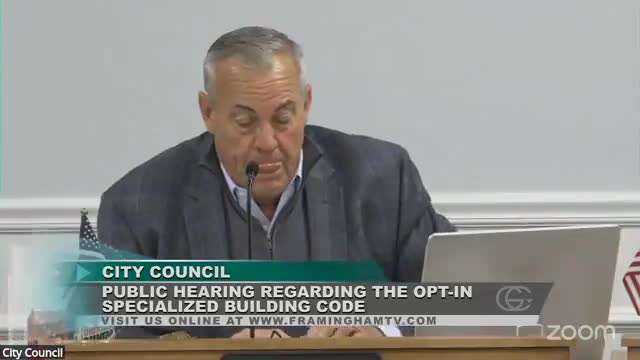Framingham council continues public hearing on opt‑in specialized building code to Nov. 18
Get AI-powered insights, summaries, and transcripts
Subscribe
Summary
After presentations from 0 Carbon MA and Passive House Massachusetts and more than an hour of public comment, the Framingham City Council voted to continue its public hearing on the municipal opt‑in specialized building code to Nov. 18 so councilors can gather more information and hear from additional stakeholders.
The Framingham City Council on Oct. 20 heard a presentation about the state’s opt‑in specialized building code and then voted to continue the public hearing to Nov. 18 to allow additional review and participation.
Architect Lisa Cunningham, co‑founder and director of the nonprofit 0 Carbon MA, told the council the specialized code “only applies to new construction” and described it as a layered set of standards that sits above the base International Energy Conservation Code and the Massachusetts stretch code. Cunningham said the opt‑in specialized code “facilitates, but does not require the electrification of new buildings” by offering multiple compliance pathways, including mixed‑fuel options, and by requiring modest measures such as pre‑wiring for future electrification and a minimum rooftop solar requirement for some mixed‑fuel buildings.
Alexander Gard Murray, executive director of Passive House Massachusetts, spoke about the passive‑house compliance path the specialized code requires for larger multifamily buildings. He summarized the technical benefits and said verified passive‑house projects typically “use 40 to 60% less energy overall compared to traditional buildings,” reduce operating costs and improve indoor air quality and resilience.
Supporters from the public urged adoption at Tuesday’s hearing. Cynthia Villanueva, reading a statement from the Framingham Democrats, said adoption is required to qualify Framingham for the state’s Climate Leaders designation and related grants. Erin Ellsworth, chair of the Framingham Sustainability Committee, urged the council not to delay, noting the city had received recent state recognition for sustainability and that the Climate Leader designation could bring capital and technical assistance to the city.
Other residents described practical benefits: easier rooftop solar installation, simplified future wiring for electric vehicles and heat pumps, and improved health outcomes in housing. Energize Framingham said a petition of more than 350 residents supports the code.
The city’s Economic Development Corporation (EDC) took a different view. Rick McKenna, EDC executive director, asked the council to defer adoption to allow a study of local cost and affordability impacts, and to consult builders and developers about implementation challenges. McKenna’s one‑page position said the EDC “recognize[s] the important environmental and sustainability goals” but recommended postponement for additional study and stakeholder engagement.
Councilors asked technical and process questions throughout the discussion. Councilor Ward asked about longer‑term implications; Councilor Cannon and others said they wanted to hear from local building officials and developers. City Solicitor Fallon was asked whether municipalities that adopt the opt‑in specialized code are automatically bound by subsequent state updates; Fallon said, “I haven’t looked at it, but I believe that’s accurate that you adopt and then any amendment thereafter,” and added she would confirm the point in writing.
After the presentations and public comment, a motion to continue the public hearing to Nov. 18 at 7 p.m. passed. The council chair said the city will try to arrange for state representatives and local building department staff to attend the Nov. 18 meeting.
Why it matters: The opt‑in specialized code affects only new construction but can change the technical requirements for new single‑family and multifamily housing and larger commercial buildings. Proponents said modest upfront requirements (pre‑wiring for electrification, small solar minimums and passive‑house standards for very large multifamily buildings) protect consumers from disruptive and costly retrofits later, improve indoor air quality and qualify municipalities for certain state funding streams. Opponents, including the EDC, asked for more local analysis of cost, permitting effects and market impacts before adopting the code.
Votes at a glance: - Motion: continue the public hearing on the municipal opt‑in specialized building code to Nov. 18, 7 p.m. (mover/second: not specified in the hearing record). Vote recorded in the meeting transcript as 10–2 in favor. Outcome: continued to Nov. 18.
Next steps: The council will receive additional information and aims to hold further public comment and a possible final vote at the Nov. 18 meeting. Councilors asked staff to invite local building department staff, developers and state representatives so the council can hear technical and implementation details before a final decision.
